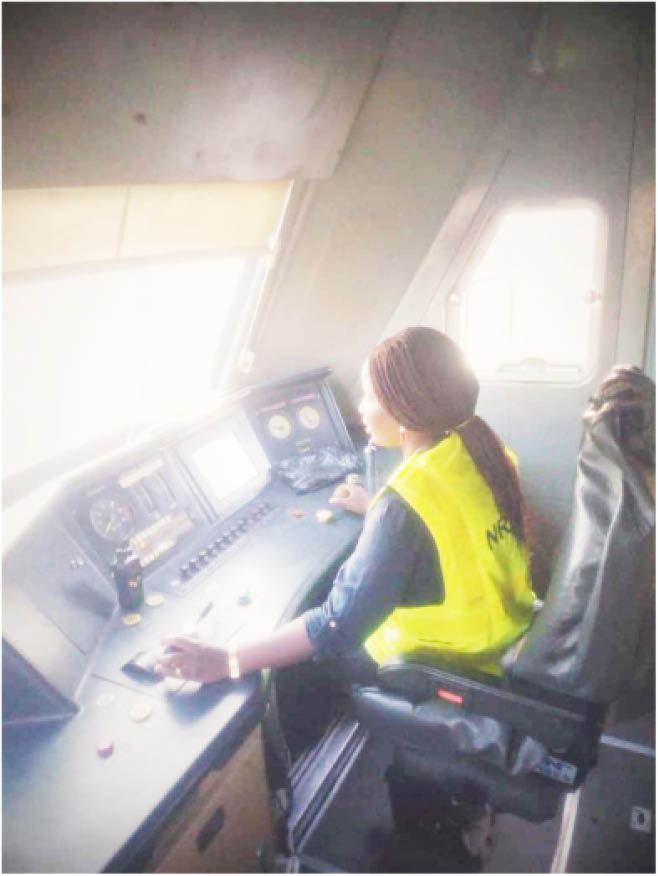Sarah Abiara is the first female train driver in Nigeria. In this interview, she explained how it all began, how she feels working in a male-dominated field, and other experiences.
How did you become a train driver?
When I applied for a job in the Nigerian Railway Corporation (NRC), it wasn’t as a train driver because I read Electrical Engineering at high institution.
- How I delivered baby in Kidnappers’ den – Katsina mum
- 20m Nigerians battle kidney disease, expensive treatment
Actually, I am a civil servant in the corporation.
When I applied, I didn’t even know which post or designation would suit me; I just filled the form and left the designation space blank. But to my surprise, I was shortlisted to come for test and interview.
The text message they sent stated that they were looking for a train driver.
I was surprised, and at the same time, discouraged because I didn’t believe a female could drive a train.
But there was something inside me that gave me the conviction that I could do it.
So I decided to give it a try since they had already shortlisted me.
I also believed that if that was what God wanted me to do, then I would be able to do it.
That was how I summoned courage and I went for the test/interview.
After the test/interview, what happened?
I passed the test and was shortlisted.
During the interview, they were surprised that a female applied for the position of a train driver for the first time.
I told them that I actually didn’t apply for the position, but that was what their message to me stated, and since I had the conviction that I could do it, I came.
The panel asked if I was sure I could do it and I said yes.
As they were contemplating, I told them to give me a trial and I would prove that I could do it.
Finally, they decided to give me an opportunity.
That was how I was tried and everyone was amazed that I was able to do it.
When did that happen?
I was employed in October, 2013.
Where were you trained?
We were trained district by district.
Some were trained in Lagos, others in the North-East, South-South and North-West.
I was trained in the North-West; precisely, Ibadan.
In the Western district, we were 20 train drivers and I was the only female.
In fact, in the history of the NRC, I am the only female train driver till date.
After the training, what happened next?
We were sent for another training in our school in Zaria. That was in 2014.
It lasted for four months. After the training, I returned to my station in Ibadan to begin work fully.
I have been driving train since then. I started as assistant driver II.
That is the position to begin before becoming a full driver, after two years when you would be able to handle train very well.
I drove for two years as an assistant, and on the third year, I started operating fully.
Which route have you been plying since you started driving?
Since I was working in Ibadan, the frequent route is Lagos to Ibadan, and vice versa.
There is also Ibadan to Kwara State.
I drove within that axis for a minimum of four years; that was from 2013 to July 2017 when I was transferred to Bauchi State; where I am presently.
What kind of train do you drive?
We drive diesel locomotive.
Is it different from the train on the Abuja-Kaduna route?
Yes. We call that one narrow gauge. Ours is not as fast as that one.
Have you ever had any accident or challenges since you started driving?
To the glory of God, since I started driving, I will say I had a challenge, but it was not out of hand.
It was only once that my train failed me; the wheel of the locomotive lost the track.
That’s what we call derailing. It happened just once. But it was not a serious incident.
There was no hazard as I was able to maneuver and fix things up within a minimum time.
What are your achievements so far?
The fact that I am the first female train driver in Nigeria today is an achievement.
Secondly, I have a job that can put something on my table, no matter how small.
Another achievement is that I have become a source of inspiration to other women to dare similar professions people hitherto thought we could not fit in or do well in it.
However, many are yet to know about me because I have just been doing my work quietly for years, without any public awareness until Daily Trust learnt of me and tracked me.
Are your family members worried that you are doing this job?
When I joined the NRC as a train driver, all my family members wondered if I would be able to do it.
My husband, however, began to understand and support me. And by the grace of God, here I am today.
As a woman in that profession, how do you feel being in the midst of men all the time in your place of work?
Right from secondary school and my further studies, I always associated with boys/men, so I am used to being among men.
I am always free with them. I attended a science and technical college in Borno State and later read Electrical Installation and Maintenance (EIM) at the Federal Polytechnic, Mubi.
We were 70 in class, with just four girls. Right from there, I have been coping with being among boys.
This gave me more courage, and today, I am the only female working among male counterparts.
My experience has made the work easier for me.

What is your projection?
My projection is just to move further.
I should be well known so that I can be a strong motivation for the female folk.
I need to stimulate the inspiration in them that nothing is impossible if they had the courage to try.
Women also need to know that there is no work that is exclusively reserved for men.
More importantly, I want to have the opportunity to train more women willing to drive trains. That’s my aspiration.
Have you ever been victimised by men in the course of discharging your duties?
No. Whenever there is anything to do, I let them know that I can do it as well.
I also correct them where necessary. I have made them believe the popular saying that, “What a man can do, a woman can do even better.’’
The men I work with understand me well. They are not the kind of men who feel they know it all.
And they are always a source of encouragement to me.
I feel free among them; they are not intimidating me in any way.
How would you describe the Bauchi operational office?
It is more or less not an operational area; it is more of office work.
Trains don’t quite shuttle the area, but when they do, I would drive.
What we normally do is to always refresh our driving skills and contemporary things.
And we do have mutual interaction classes on what we practise in the field.
It is important because we have to refresh our minds always since any task can be assigned at any time.
Considering the nature of your job, how are your husband and children coping?
My husband knows the nature of my job and he is always supportive.
We reside in Jos, Plateau State, but even when I was in Ibadan, he understood me very well.
Most of our trips are at midnight, and before I leave my station I let him know.
He always understands. At times, he would call to know how far we have gone and the remaining distance to my destination.
But to his surprise, most times I would have already arrived at my destination whenever he called.
By and large, my husband and family have been very supportive.
What is your advice to the authorities on the railway transport sector in Nigeria?
The sector should be revitalised so that women can come in as drivers; that will make it more fascinating.

 Join Daily Trust WhatsApp Community For Quick Access To News and Happenings Around You.
Join Daily Trust WhatsApp Community For Quick Access To News and Happenings Around You.


